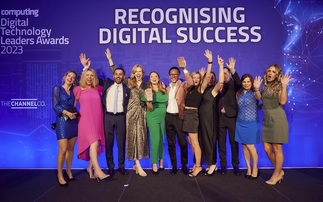“Education is the most powerful vehicle the UK has to raise ambition, open doors and transform lives,” says CDO of the Year finalist Andrew Proctor
A successful CDO must communicate effectively, be transformative and possess both business acumen and customer focus. So says Andrew Proctor, Pro Vice-Chancellor - Digital at Staffordshire University, who is a finalist for CDO of the Year at the upcoming Digital Technology Leaders Awards.
Proctor graduated, from the same institution he now works at, in 1999. The first of his family to attend university, he says the experience "opened doors and created opportunities that otherwise may not have been afforded me." After leading digital at the West Midlands Police for five years, he felt the opportunity to return to the University, and act as a force for good in creating the next generation of graduates, was "compelling":
"I am a huge believer that talent is equally distributed whereas opportunity is not, and education is the most powerful vehicle the UK has to raise ambition, open doors and transform lives. With the impact of Covid-19 and Industry 4.0 on the job market, education is more important than ever, so I feel very privileged to work with a talented team in such an important sector."
Proctor is responsible not just for the University's technology, but its entire IT estate across campuses in Stoke-on-Trent, Stafford, Shrewsbury, Lichfield and London. He has been key in driving innovation at an institute known for its digital investment. For example, Staffordshire claims to be the first university in Europe to have migrated to the cloud; the first to launch an AI-driven coach and assistant for students; the first in the world to launch a degree in e-Sports; and the first in the UK to partner with BluePrism and apply Intelligent Automation to its services.
"Cloud migration came first, because it was key to creating the space and time for our internal teams to focus on creativity and innovation; we significantly reduced our infrastructure support burden, which meant we could move away from business-as-usual to prioritise transformation.
"The cloud project created the platform for the successes and innovations that have followed since. Everything we do at our university is focused on what we do for our students, so when assessing our priorities we always look at the initiatives that will have the most positive impact on them."
Although the partnership with BluePrism has been a focus for Proctor this year, at the same time he and his team have launched a new project called CX. He describes it as, "An ambitious programme deploying the use of techniques such as design thinking, user experience and service blueprinting to redesign our support offer for students. CX will bring together some of our previous work with AI and CRM to provide students with the best support experience in the sector. We will be re-designing and hyper-personalising our support services around student needs and preferences."
The work will continue next year, when Staffordshire will combine the results of CX and other initiatives to provide staff and students with valuable real-time information. At the same time, the University will launch its new Health Innovation Centre, helping to improve the digital skills of health workers in the area.
"We've seen over the past few months how incredibly important the NHS is, and Staffordshire University will be at the heart of supporting our wonderful NHS workers to meet the challenges of the future," says Proctor.
Finding CDO success
Modern organisations often have more than one person looking after their technology. The CIO will work with IT to support enterprise goals, while the CTO will make decisions about overarching technical infrastructure. The CDO, on the other hand, is both a digital expert and general manager, often helping to drive change and technology adoption in an analogue business. Thus, the ability to communicate with different stakeholders is crucial.
"In my view, the first key quality to become a successful CDO is the ability to communicate effectively at a variety of levels. Leadership is often about sense-making and storytelling, preparing people for an exciting but challenging journey and leading them throughout. It is a given that CDOs are able to understand new and emerging technologies, but it is vital that they can explain the opportunities these present in a way that makes sense to their specific business or organisation."
Next, the CDO must be able to lead, and foster an environment that encourages innovation.
"The second quality is transformational leadership. In order to ensure any IT, digital function and the wider organisation is at the vanguard of transformation, it is vital to establish a culture and environment for all staff, regardless of their role, to be innovative, creative, courageous and embracing of change. A core part of leadership is the creation of a platform that enables staff talents to flourish."
Finally, as a link between business and IT, the CDO must understand the business's goals and how to relate them to technology.
"The third quality is business acumen and customer focus. In order to translate digital opportunities into realistic organisational benefits, CDOs need a deep understanding of their customers and the sector they work within, as well as their specific organisation. Using their customer focus, CDOs should be outcome-driven, and not simply focused on technology. Digital transformation is never solely about technology: of equal importance are people, culture and fresh approaches.
"The CDO has a key role to play in this space, to identify ‘softer' aspects of the business that would benefit from change - increasing pace and agility. All modern organisations need to form compelling partnerships with companies across their ecosystem and beyond, and CDOs should be adept at identifying and developing partnership opportunities."
Proctor and his team are hoping for success at this year's Digital Technology Leaders Awards, which shine a light on the achievements of technical staff and companies. This year the event will take place as a virtual ceremony, on the 21st October. Proctor says:
"The Digital Technology Leaders Awards are a fantastic opportunity for professional networking, and to shine a light on the incredible work taking place throughout the UK. At these events, I hear many inspiring stories and experiences that make me reflect, spark new ideas or thinking and generally make me feel both proud and fortunate to be amongst such talent in an exciting industry. They provide an opportunity for serendipitous encounters and the forging of new relationships."
Finalists, remember to book your place today.






















